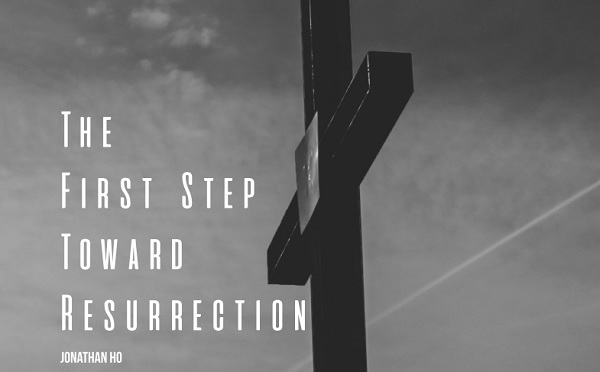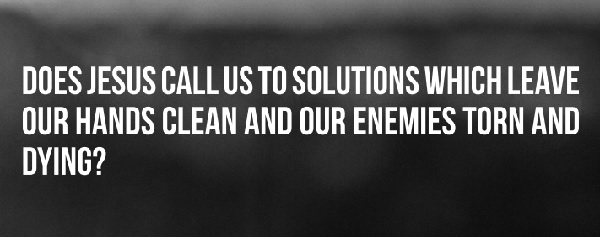The First Step Toward Resurrection
By Jonathan Ho

Watching someone get killed is scary.
I remember watching one video of a man named Alton Sterling getting pinned down and then shot. I felt my stomach turn, unsure of how to react. I wanted to look away as the man lay in a growing pool of his own blood. As videos become more easily recorded and uploaded, it has become easy to find videos of injustice and abuse, both on the end of civilians and on the end of the police.
With so many perspectives bombarding us about the Black Lives Matter movement, political talk during this election season between Donald Trump and Hillary Clinton, and bombings in New York City and other places, it can feel impossible to know how to react in response to all of these charged events. Do we march? Do we pray? What do we do?
It’s easy to seek quick answers and to point fingers, but before we step into action, we must also realize that as humans we naturally seek to preserve ourselves and our ways of thinking and acting.
Martin Luther King, Jr. once wrote, “In any nonviolent campaign there are four basic steps: collection of the facts to determine whether injustices exist; negotiation; self purification; and direct action.”1 Self-purification involved ensuring every member of the nonviolent campaign was ready to turn the other cheek when hit, to be prepared to be jailed, etc.
Paul writes similarly in his second letter to Timothy that we are like vessels and we must cleanse ourselves from dishonorable practices in order to be useful to the Lord.2
While our response to injustice may include a variety of different actions, followers of Jesus are called to Spirit-led action, action which is motivated and led not by this world’s motives but by those of the Spirit. As one friend recently put it, “The world and its means will never change the world. The world seeks its own, and using its own weapons to fight will not change it. Only God can.”3 It’s as if you are using fire to put out fire. It just doesn’t work that way.

We all experience fear, anger, and bitterness, but we must learn to walk in neediness and trust in God or else we will continue to be part of the problem. Unless we abide in Jesus and have Jesus’ word abide in us, we can do nothing.4 It is easy to distance the issue, but if we cannot learn to love in humility then we will only add fuel to the fire. Though we may want to start with quick solutions or popular movements, we must prepare and examine our hearts first. We must find the motivation which comes from outside of ourselves, that which is shown and found in Jesus.
What is this motivation? Love.5
I’ve always wanted to love others well, but something I’ve found is that good intentions do not always translate into faith working through love.6 Wanting to love is not the same as loving. Wanting what’s best, yearning for what’s good is important, but unless our desires translate to action, preferably thoughtful steps of faith, we will end up wasting time. How do we know we love? The proof of love in our lives is to love God and do what he commands.7
Doing what God commands requires perseverance and is a whole-life commitment, not merely reflected in one day’s work. In a world of instant downloads and same-day delivery, it’s hard to focus on taking longer paths which take time. In a world full of criticism from every side (try posting a debatable topic onto Facebook and see how fast you get a response), perseverance in pursuing what is good despite making mistakes is hard. And so we often default to what’s easier, whatever gets results more quickly.
But a call to love is a call to love as Jesus loved us, which means laying down our lives. As we read in a letter written by John,
By this we know what love is: Jesus laid down His life for us, and we ought to lay down our lives for our brothers. If anyone with earthly possessions sees his brother in need, but withholds his compassion from him, how can the love of God abide in him? Little children, let us love not in word and speech, but in action and truth.8
Following Jesus requires a death to self, a death to selfishness and self-exaltation. Unfortunately, it is easier to take the path of laws and patterns rather than the individual death to self to love those around us. We can either choose to keep ourselves “clean” and choose cleaner, easier routes to try to force change or we can choose to enter the mess that is a relationship with someone else.
Paul once wrote,
Have this attitude in yourselves which was also in Christ Jesus, who, although he existed in the form of God, did not regard equality with God a thing to be grasped, but emptied himself, taking the form of a bond-servant, and being made in the likeness of men. Being found in appearance as a man, he humbled himself by becoming obedient to the point of death, even death on a cross.9
Following Jesus requires walking in the ways and attitude of Jesus. In his article, Matt Reffie discussed how Father George Zabelka had blessed the crew who dropped the atomic bomb on Nagasaki. Father George Zabelka later described how he would never condone a soldier shooting a child in the head, and yet at one time he had no second thoughts about the bomb which mutilated children and left thousands upon thousands dead.10
The atomic bomb was an effective and quick way to get things done.
But is this the path Jesus calls us to in our relationships? While dropping the bomb led to results, it also resulted in the deaths of thousands of civilians, all for the rationale of saving another nation’s people. Does Jesus call us to solutions which leave our hands clean and our enemies torn and dying?

Father George Zabelka later worked with Martin Luther King, Jr. during the Civil Rights struggle and shares these words of Martin Luther King, Jr. after he was jailed in Montgomery:
Blood may flow in the streets of Montgomery before we gain our freedom, but it must be our blood that flows, and not that of the white man. We must not harm a single hair on the head of our white brothers.11
Jesus had the power to call legions of angels to save himself, but he chose to stay on the cross to die for us. He could have wiped out the Roman soldiers and took himself off the cross but instead he chose to remain on the cross, experiencing ridicule, torture, and a slow death. One man died for the many.
As followers of Jesus, we are called to walk as Jesus did. And as we look to God’s call we must ask ourselves whether we are called to fast solutions or the incarnation of Jesus.
Dying to self means much more than giving up money and time. Jesus left the perfect situation to enter our world, an imperfect and different world. Entering into another world is hard.
I remember when I first volunteered to tutor local high school students from Central America. Everyone was a stranger to me, from the teacher in charge to each student there. I felt out of place that first night as I couldn’t keep up with everyone else who was fluent in Spanish. It was hard, but it was a first step into another world. A step I trusted God wanted me to take, but one which felt scary and unstable even after the first few weeks.
Stepping into a job of working with adults with developmental disabilities felt like a waste of my youth. I was scared of driving the adults home, worried about having to possibly physically restrain someone.
As an Asian American, I have found clashes in culture as my past community-focused Asian culture clashes with my present individual-focused American culture. I remember living in a community house during the winter, going outside to shovel the sidewalk, partially expecting people to offer help as I gathered my coat and shovel, only to see nobody offer anything. Instead of being given offers for help, I was expected to speak up for help.

I grew up where people rarely criticized me in front of others and now I often find myself in situations where people bluntly tell me, in front of other people, what I’m doing wrong or what I missed. They sometimes do so in a loving manner, but it is hard when your whole life has included a focus on not shaming others in public. It is hard to realize they mean well when it feels so foreign to me.
And yet, discomfort is not to be avoided. In order to follow Jesus we must deny ourselves and take up our crosses.12 Death is messy. Death to self is messy and hard, but it is also what Jesus calls us to. We are called to enter into the worlds around us and lay down what we hold dear: our pride, our demand for our own rights, and our lives (even when we have the power to force change). We are not called to just bear trials but to engage and take the time to communicate effectively with one another.
I believe change comes through different living, one moment at a time. I believe a simple way for you to die to yourself is found in an assignment I once received: pursue another person and listen.
We all want to be known, but have you tried helping another person feel known? Especially someone you don’t already love? Someone different from you?
Find someone different from you and initiate a conversation; seek to know them over a sustained period of time. Initiating is scary, but unless you do, who will? Ask God to open your eyes to their heart and to see God’s image within them. Find out what they love, what they’re passionate about and then listen some more. Listen until you feel for them. Ask them questions, and die to yourself: don’t cut in when they say a word or phrase which reminds you of a funny or interesting story. Meet them in their environment; make the effort to drive or take public transportation to them, to what they enjoy. Jesus left the ninety-nine to find the one.
And finally, pray for them. Seek to know them so that when you leave you’ll somehow be reminded of what’s on their heart later on that week. Realize that at heart you are both quite the same.
We can choose to passively isolate ourselves, pass or push for policies, and speak and sing of love, or we can choose to take a step towards someone different and join Jesus in his work in the people all around us. Every first step is awkward and scary, but as we die to self we will find true resurrection and the necessary neediness and hunger for God’s Spirit to fill us. And in doing so, our hearts shall be changed and we shall find the life that is truly life.
Jesus did not call us to a journey through a wide gate and broad path, but the journey through a narrow gate and difficult path. As fish in the water, we find our greatest life in an atmosphere of faith, and faith is only necessary where we do not fully know, where we realize that we do not have full control.
May we learn to take the first step toward resurrection, which is found in dying to ourselves.
References
1 King, Jr., Martin. “Letter from a Birmingham Jail.” Africa.UPenn.edu. https://www.africa.upenn.edu/Articles_Gen/Letter_Birmingham.html (accessed October 2, 2016).
2 See 2 Timothy 2:20-26
3 See 2 Corinthians 10
4 See John 15
5 See 1 Corinthians 13
6 See Galatians 5:6
7 See 1 John 5:2
8 1 John 3:16-18, NASB
9 See 2 Corinthians 10
10 Zabelka, “Blessing the Bombs – by the Father George Zabelka.” Plough.com
11 Luke 9:23, NASB
12 Luke 9:23, NASB


 Jonathan Ho studied Sociology and Economics in college and interned with Cru (formerly Campus Crusade for Christ) for one year. After his internship with Cru, he worked in marketing and then stumbled into human services working with adults with developmental disabilities. He currently works in a Quality department managing abuse investigations in mental health and developmental disability services. He’s still a work in progress but he is slowly learning the way of Christ through God’s grace, loving community, and lots and lots of mistakes.
Jonathan Ho studied Sociology and Economics in college and interned with Cru (formerly Campus Crusade for Christ) for one year. After his internship with Cru, he worked in marketing and then stumbled into human services working with adults with developmental disabilities. He currently works in a Quality department managing abuse investigations in mental health and developmental disability services. He’s still a work in progress but he is slowly learning the way of Christ through God’s grace, loving community, and lots and lots of mistakes.